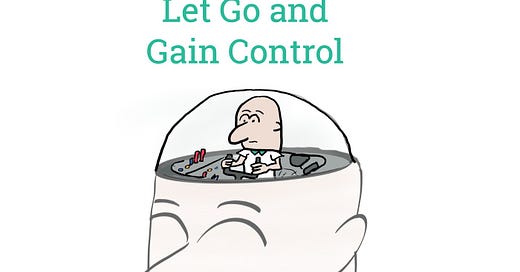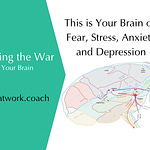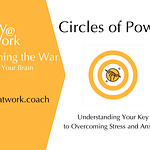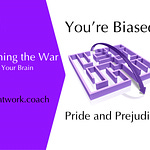Encourage One thing that separates the calm and joyful person from the stressed and depressed is a useful balance something known as the locus of control. Someone with an internal locus of control believes that he or she can influence events and their outcomes, while someone with an external locus of control blames outside forces for everything. In general terms, if you believe that everything is beyond or outside your control, then you are likely to be more anxious, highly stressed and quick to blame others for all failings. And normally, a high internal locus of control means that you accept responsibility that your abilities and effort determine your outcomes. An internal locus of control is going to bring you more benefits in the long-term as you choose to be at cause for your life. But let's be clear, it's a belief that you can influence events and their outcomes, not always control them. What we need is an appropriate balance of being in control. Indeed oftentimes we need to let go to gain control. You may feel stressed because you believe that everything depends entirely (and exclusively) on you and your efforts, or you may be feeling stressed because you believe that nothing at all is within your control. Develop What helps distinguish between being stressed out and effective is about control and, quite literally, how "hands-on" you are. If you have ever learned to play the game of golf, you'll know that at the beginning of learning to play that you grip the club tightly. After all this is basically holding onto a stick that you will swing through the air and hit a ball. Allowing the club to "follow-through' - if you don't hold on tight, the club might just go as far as the ball. I appreciate that you may have never played golf, but you can liken this also to the tight grip of the reins of a horse to controlling your dog on a very short leash to holding on tight to your child's hand New golfers have to learn how to 'let go' - to relax their grip. If a tight grip is a ten on a scale, we want a 4 out of 10. The same is true of leadership and the way we hold on to our people. Hold on too tight (micromanage) and people have little freedom to use their own skills and strength. Hold on too tight to the club, and it is the golfer doing all the work. So the question is: "who should be doing the work?" The manager or leader or the member of staff, or someone else more capable or who has more time to spare? A golf club is weighted for a reason. If you allow the club to do the work, the swing and striking of the ball, becomes almost effortless. Relax your grip on your team and allow them to excel at what they do, and the work becomes almost effortless. Once you know, as a golfer, that the club is designed to do the job of striking the ball, and your job is simply to swing and allow physics do to its job, you can relax. Maintain just enough control to ensure alignment, direction and distance and the ball will fly according to the club used, and the size of the swing. If you want a long distance, you use a long club and a full swing. A short distance off the fairway onto the green requires a shorter distance club and a smaller swing. The power to achieve the distance lies in the tool being employed and the chosen swing - the rest is pure physics. Guide So what can we learn as a leader? To hit your target, at some point you have to let go Isn't it the same? Make sure that you are using the right tool(s) - the person needs the right skill set (and/or mindset) and time to do the required job. The leader's job is to have a little control to ensure that the skills are employed in the right direction for the right distance - that's about judging how far it is to the goal and translating that into the swing itself - in the case of people, the swing is influence and motivation... let the staff do the rest. And just like that golf ball landing exactly where you both planned and wanted it to be for the next shot. You celebrate. Unlike golf,
Joy@Work Podcast
Helping marketplace leaders #UnStuck their true potential to thrive in life and leadership to build a successful, sustainable business with collaborative, high performance teams and Joy@Work with practical, neuroscience-based AdvantEdge Guides and coaching.
Helping marketplace leaders #UnStuck their true potential to thrive in life and leadership to build a successful, sustainable business with collaborative, high performance teams and Joy@Work with practical, neuroscience-based AdvantEdge Guides and coaching.Listen on
Substack App
RSS Feed
Recent Episodes














Share this post